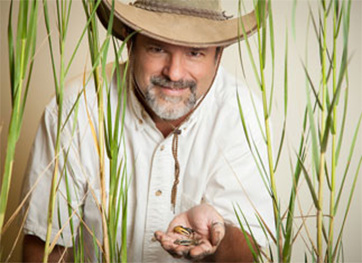A Night at the Museum: Science Comes Alive at NSM Event
Culture and Science Series Offers Live Demonstrations by UH Professors at Sugar Land
Museum

Biology professor Steven Pennings will offer one of seven interactive demos for guests
at the next Culture and Science event. (Credit: Chris Watts)Explosive chemistry, walking with dinosaurs and living in space are among a menu of
entertaining scientific demonstrations to be presented by University of Houston (UH)
professors at the next Culture and Science event Saturday, Oct. 11 from 6-9 p.m.,
at the Houston Museum of Natural Science at Sugar Land. Tickets to “A Night at the Museum: Making Science Come Alive!” are $45 per person and include museum admission, multiple food stations and two
wine tickets.
Much like a science fair for adults, the event will feature seven interactive exhibits from physicists, biologists, chemists, mathematicians, geologists and computer scientists. With four show times for each presentation, guests will have the opportunity to select demonstrations of interest. Hosted by the UH College of Natural Sciences and Mathematics, the event provides a forum for discussion and exploration of how science applies to cultural interests.
The demos include:
Chemistry: Not Just for Nerds!
While introductory chemistry is usually presented as a very dry science, with more
calculations than fun, chemistry professor Simon Bott will show that it’s really a
science of light, colors, energy and utility. Guests will not only observe, but also
participate in explosive chemistry experiments illustrating how to introduce fundamental
concepts through inquiry, while stretching the limits of the fire alarm system at
the museum.
Shun Stains Away: The Solution for Stain-Free Carpet, Clothes and Furniture
Physics professor Seamus Curran will demonstrate the uses for Shun Coating, a line
of sealants and coatings he developed to provide protection from water damage, corrosion
and stains. The coating is manufactured by C-Voltaics, a nanotech manufacturing company
launched by Curran, and can be used on fabrics, glass, carpets, home interiors and
wood.
Animals without Backbones Rule the World
While nature programs usually pay more attention to birds, mammals and fish, it’s
the animals without backbones – the invertebrates – that do most of the hard work
in nature. Biology professor Steven Pennings will present live examples of several
charismatic invertebrates that are important in the ecology of coastal habitats. Guests
will be given the opportunity to get up close and personal with a variety of live
invertebrates while Pennings explains their ecological roles.
Computer Gaming in Reality
Led by computer science professor Chang Yun, who is co-founder of the UH Gaming Program,
three students from the Interactive Game Design Program will share the computer games
they developed. One game is set in a futuristic world, taking players through a war
between machines and mammals. The other is designed to help autistic children with
elementary motor skills training, allowing them to improve motor function. Attendees
can test drive either of these two student-created computer games.
Walking with T-Rex
Geology professor Peter Copeland will walk attendees through the paleontology exhibit,
explaining what we know about dinosaurs and how we know it. He will discuss the current
hypotheses for one of the most important events concerning life on Earth – the extinction
event at the end of the Cretaceous period 65 million years ago.
Now You See It. Now You Don’t: The Mathematics of Perception
Math professors Krešimir Josi? and Zachary Kilpatrick will offer a glimpse into perceptual
rivalry, which occurs when perception alternates between multiple interpretations
of a scene. They will discuss how mathematics explains how and why this occurs, detailing
their research into understanding how humans interpret complex visual images.
Living in Space
Physics professor Lawrence Pinsky will illuminate conditions in space while his audience
gazes at videos in the planetarium. He will offer two topics – radiation hazards in
space and collaborative research to simulate the conditions during the big bang.
For more information or to purchase tickets, visit http://nsm.uh.edu/news-events/culture-science/ or contact Hillary Norwood at nsmrsvp@nsm.uh.edu or 713-743-2611.
- Lisa Merkl, University Media Relations